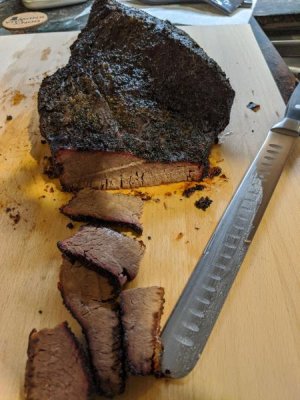cduff
MemberGot rid of the matchlight.
Hello all! I am a BBQ newbie and I just tried my first brisket over the weekend. The point turned out very well, but the flat was much tougher and dry. What I don't know is if it was overcooked or undercooked? Any thoughts based on the following data?
- Brisket was 10.8 pounds. Trimmed it at 10:30 pm and added Salt & Pepper rub
- Returned to fridge for 5 hours
- Removed from fridge at 3:30am. Let sit at room temperature for 1hr, then injected with beef broth. (Since it was my first attempt, I wanted to make every attempt to make sure it did not dry out)
- Placed on cooker at 4:45 am, WSM, bottom rack, fat side down, water in the pan. It was a really cold morning (28°), so for the first stretch I had a hard time getting the WSM temp up even though the vents were wide open (230°-240° - My plan had been 250°)
- Let cook undisturbed for 4 hours.
- Opened lid and checked at 8:45am. From everything I read, it looked ready to wrap (I used butcher paper). Fat was rendering, crust was formed, brisket was brown. Temp of flat was 170, point was 157. It looked very moist… I have seen a lot of videos where people spray because it looks really dried out. Mine did not look like that at all.
- Wrapped, returned to WSM. As the morning warmed up I was able to get the WSM temp warmer… The remainder of the cook was consistently between 240° – 260°.
- Everything went as expected for a while. The stall hit shortly after I wrapped it. I did not take the cover off for 5 more hours until I refilled the water pan at about 1:00 pm. Then at about 2:00 I added more coals through the side door.
- Here were my temperature readings starting with when I wrapped it (Point / Flat):
4 hrs: 157 / 170
5 hrs: 162 / 180
6 hrs: 167 / 176
7 hrs: 168 / 168
8 hrs: 168 / 164
9 hrs: 174 / 170
10 hrs: 181 / 185
11 hrs: 183 / 192
12 hrs: 185 / 202
Finally after 12.5 hours I needed to pull it because rain was coming and it was time to eat anyway, even though the flat felt firm yet.
SO in a nutshell, at 185 the point was very tender, and at 202 the flat was still hard and tough. Do you think it needed to be left on even longer? I didn't expect a smaller brisket like that to need to be on for 14+ hours, but maybe it did? Thanks for any suggestions!
- Brisket was 10.8 pounds. Trimmed it at 10:30 pm and added Salt & Pepper rub
- Returned to fridge for 5 hours
- Removed from fridge at 3:30am. Let sit at room temperature for 1hr, then injected with beef broth. (Since it was my first attempt, I wanted to make every attempt to make sure it did not dry out)
- Placed on cooker at 4:45 am, WSM, bottom rack, fat side down, water in the pan. It was a really cold morning (28°), so for the first stretch I had a hard time getting the WSM temp up even though the vents were wide open (230°-240° - My plan had been 250°)
- Let cook undisturbed for 4 hours.
- Opened lid and checked at 8:45am. From everything I read, it looked ready to wrap (I used butcher paper). Fat was rendering, crust was formed, brisket was brown. Temp of flat was 170, point was 157. It looked very moist… I have seen a lot of videos where people spray because it looks really dried out. Mine did not look like that at all.
- Wrapped, returned to WSM. As the morning warmed up I was able to get the WSM temp warmer… The remainder of the cook was consistently between 240° – 260°.
- Everything went as expected for a while. The stall hit shortly after I wrapped it. I did not take the cover off for 5 more hours until I refilled the water pan at about 1:00 pm. Then at about 2:00 I added more coals through the side door.
- Here were my temperature readings starting with when I wrapped it (Point / Flat):
4 hrs: 157 / 170
5 hrs: 162 / 180
6 hrs: 167 / 176
7 hrs: 168 / 168
8 hrs: 168 / 164
9 hrs: 174 / 170
10 hrs: 181 / 185
11 hrs: 183 / 192
12 hrs: 185 / 202
Finally after 12.5 hours I needed to pull it because rain was coming and it was time to eat anyway, even though the flat felt firm yet.
SO in a nutshell, at 185 the point was very tender, and at 202 the flat was still hard and tough. Do you think it needed to be left on even longer? I didn't expect a smaller brisket like that to need to be on for 14+ hours, but maybe it did? Thanks for any suggestions!



